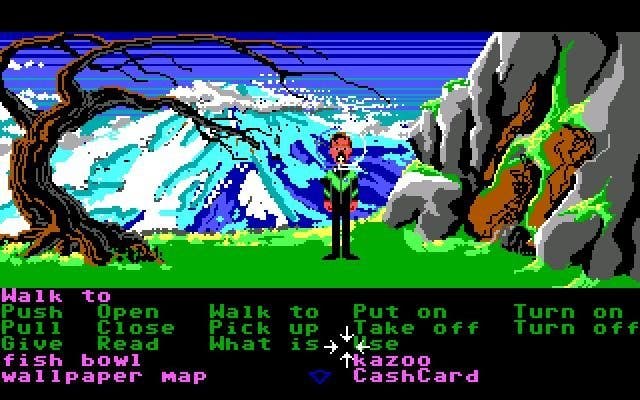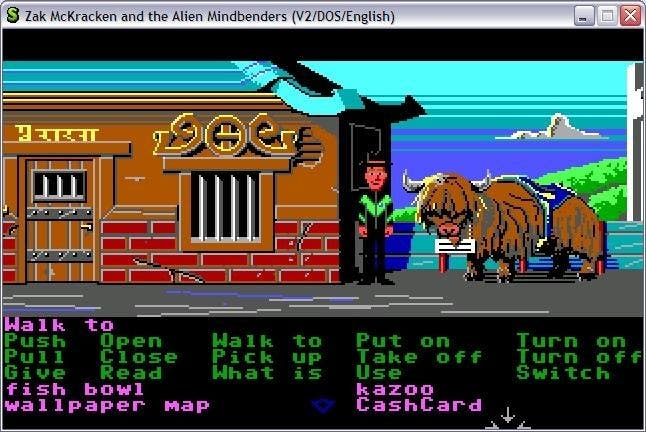Retrospective: Zak McKracken and the Alien Mindbenders
Getting stupid.
I wonder if I'm getting stupider. Zak McKracken and the Alien Mindbenders came out in 1988, when I was 11 years old. It seems impossible to believe that at the age of 32 I can have become worse at games. And yet while my memories of playing Zak Mak when it first came out are extremely hazy, I certainly don't remember getting stuck quite as often. What I do remember is that I really enjoyed it. I've since been told by those who should know that this cannot possibly have been true. So I've gone back to find out.
LucasArts is much heralded as the company that refined the point-and-click adventure into something more coherent and fair than those of its rivals at Sierra Online, Westwood, and so on. However, while this may have eventually become true, it certainly wasn't in 1988. It's hard to believe that much of Zak McKracken came from the same studio that went on to create Monkey Island, and of course the greatest of them all, Day of the Tentacle.
And yet so much else feels like a prototype for those games to come. Alongside random deaths, the ability to play yourself into a dead end, and some extremely primitive storytelling, are also multiple-character puzzles, an elaborate plot, and a great deal of familiar daftness.
Worrying about stupidity is particularly apposite here. Aliens have invaded Earth, taking over telephone companies, and are broadcasting a signal that is making humanity increasingly stupid. Zak is a reporter for an American newspaper, based in San Francisco, who is asked to file a report on reputed sightings of a two-headed squirrel in Seattle. He is not pleased by this.

And so it begins in extremely familiar adventuring style. This is from the era of LucasArts games with the verb system at the bottom of the screen (see the screenshots), so you built instructions by clicking on words and objects in the world. "USE" "butter knife" "squirrel", for instance. Although it lacks the option to "LOOK AT" something, which makes for a strange time in an adventure world. (Maniac Mansion made the same decision.)
Despite not being able to look at anything, Zak can pick up anything that isn't glued down and add it to a really quite enormous inventory. The first stages are about getting to Seattle, which involves discovering aliens running the phone company. And waking a bus driver up with a kazoo. And psychically knowing to use a yellow crayon on a scrap of wallpaper to write down the contents of a dream. Indeed, even the reasonably good opening section is riddled with problems. And disappointingly this just gets worse.
It's packed with some really splendid ideas, but Zak McKracken turns out to be a blot - nay, a blight - on LucasArts' fantastic adventure CV. So why on Earth did I remember it being so brilliant?
I would never have gotten through this globe-trotting, multi-route, multi-character cacophony without using the mighty GameFAQs, and every other minute at that, because Zak McKracken is structured in a fascinating way. It could have been something extraordinary in a better game - you can travel to about eight different countries, in any order you choose, playing as four different characters (two of whom are on Mars), solving some puzzles in a variety of different ways - but it's such a pain to play that these wonderful elements only create further obfuscation.

The game is huge. Twice as long as most adventures of the era. It even has a complex money system. Zak (and indeed Annie) must pay their way, purchasing items from the pawn shop, and more frequently buying tickets for flights. While you start with a generous $12,000, head to the wrong country (which you've not been told about, nor told why you might need to go there, nor warned that you'll need to go there in order to fly somewhere else that can only be reached from there...) and you'll have wasted a thousand bucks.
So how do you make more? Well, you could always find your way to an alien base (proving your friendship with the alien leader by showing him the fan club membership card you have, because you filled out a membership form in the phone company offices and then posted it by, er, putting it in your own letterbox), and then use their lottery-predicting machine. Go back to San Fran, buy a ticket, pick the right numbers, and you'll soon get a bonus $10,000 in your account. Novel, but beyond insane.
By the time you're worrying about maintaining the oxygen levels for two characters on Mars, whether Annie's got enough money to travel to Cairo, or whether Zak picked up the lighter from the aeroplane that's going to be extremely necessary for playing any further, there's far too much going on to let you struggle with clicking everything on everything to get past the latest berserk situation.

